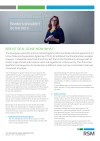The (European Union) EU and the United Kingdom (UK) have finally reached agreement on a Free Trade and Cooperation Agreement (TCA). A hard Brexit has therefore been avoided. However, it should be noted that the UK has left the EU and therefore is no longer part of the EU single market and customs union and regarded as a third country. This status has significant consequences for businesses in different areas such as cross border trade and movement of people.
The remaining EU 27 governments are set to approve the outline before January 1, thus giving a go on the TCA which will usher in a new era of EU-UK trade and provide the framework for continued trade relations once the UK leaves the internal market and customs union on 31 December 2020. At over 1200 pages and affecting over $900 billion worth of goods and services, the TCA is the most ambitious and far-reaching trade agreement ever concluded by the EU and puts to rest a protracted period of fierce disagreement between EU and UK negotiators.
Europe may be moving on, but businesses needs to take a moment to unpack and fully comprehend the effect of the TCA on cross-border trade between the EU and UK. Given the length and importance of the TCA, this will take some time.
We will get to the bottom of all uncertainties that might be out there now and provide our insight and opinion on selected aspects of the TCA in the coming months, but in the meantime set out our priority checklist which highlights the central pillars of the TCA:
1. Tariff and quota free trade of goods
- The TCA establishes zero tariffs or quotas on trade between the UK and the EU, where goods comply with rules of origin requirements.
- Notwithstanding the tariff and quota free trade enshrined in the TCA, certain technical barriers to trade continue to apply and address issues related to technical regulation, conformity assessment, standardisation, accreditation, market surveillance and marketing and labelling.
- In short Brexit ends the EU easiness of moving goods freely, but the TCA only adds administrative burdens and no taxes.
2. Trade in services
- The TCA includes well-established provisions on cross-border trade in services that will secure continued market access across a broad range of sectors, including professional and business services, financial services and transport services, and will support new and continued foreign direct investment.
- In relation to financial services, although the TCA provides for “continued market access” the details have been left for later. The EU and the UK are yet to discuss “specific equivalence determinations” which will eventually be codified in a Memorandum of Understanding.
- The UK and the EU have agreed a framework for the recognition of professional qualifications which is based on the EU’s recent free trade agreements.
- The effect of Brexit and the TCA on cross-border trade in services differs from sector-to-sector. For example, UK resident financial services firms previously possessed “passporting rights” which allowed them to sell financial services into the EU. The TCA has not granted equivalent rights meaning that on 1 January 2021 UK resident financial firms will lose their right to sell financial services in the EU.
3. People & Mobility
- Residence rights in existing cases in the UK and EU will continue to be respected as long as the residence situation remains unchanged. New residency applications after the transition period will likely be subject to the same procedures as for third countries.
- Existing (frontier) workers will have the right not to be discriminated against on grounds of nationality as regards employment, remuneration and other conditions of work and employment. In addition, they will have the right to take up and pursue activities and assistance by employment offices in the same way as offered to own nationals as well as rights to tax, social advantages, housing benefits and access to education for their children.
- Prior to Brexit, UK citizens (like all other EU citizens) were granted unrestricted rights to live and work in the EU, and vice versa. EU citizens and workers who exercise their right to move freely within the EU are protected against discrimination.
4. Subsidies and State Aid
- One of the key issues of concern of the EU was ensuring that the UK could not grant subsidies (tax or otherwise) to UK businesses which would effectively allow them to undercut similar businesses in the EU.
- The EU and UK are free to determine their own rules relating to the granting of subsidies but are bound by broad principles which must inform the contents of the rules. For example, the rules must ensure that the granting of a subsidy does not have detrimental effects on the trade between the EU and UK.
- The EU and UK shall each establish independent bodies which will design and oversea these rules and which are subject to the review of their respective domestic courts.
- The EU and UK have agreed on a reciprocal dispute resolution mechanism (an accelerated arbitration procedure) where a party is of the opinion that a subsidy is causing, or is at risk of causing, significant harm to its industries.
- Whilst part of the EU, the UK was bound by the EU’s laws related to state aid and government subsidies and was subject to oversight by the European Court of Justice (EUCJ), a sore point for the UK public. Brexit effectively removes the applicability of these laws and jurisdiction of the EUCJ.
More information
If you have any questions regarding the Brexit deal, please contact your trusted RSM advisor.
Download 'Brexit deal done; Now what?' in pdf.

